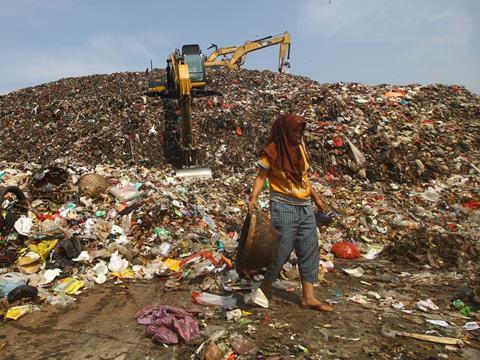
The World Economic Forum’s Global Plastic Action Partnership (GPAP), the Ellen MacArthur Foundation’s Plastics Initiative and WRAP have announced a collaboration set to share knowledge between their global initiatives and encourage global progress in combating plastic pollution.
Each of the organisations founded national-level initiatives in 2018, with over twenty countries now involved. Plastic Pacts have already been established by the Ellen MacArthur Foundation in Australia, New Zealand, the Pacific Islands, Canada, Chile, France, India, Kenya, the Netherlands, Poland, Portugal, South Africa, the UK, and the US. A new pact is currently in development in Colombia.
National Plastic Action Partnerships are also being developed by the World Economic Forum in Indonesia, Vietnam, Pakistan, Nigeria, Ghana, Ecuador, South Africa, Maharashtra in India, and Mexico City in Mexico as part of the GPAP project.
By bringing these programmes together in a shared network, the NGOs hope to combine worldwide resources in a pre-competitive mindset, including support for the development of national action plans, financing roadmaps, tools for baseline assessment and scenario modelling, and private-sector action to meet targets for reduction, reuse, and recyclability.
It is hoped that the knowledge exchange network will unite key stakeholders across sectors – including businesses, NGOs, government institutions and civil society, and citizens – to highlight the gaps in global and domestic policy that are currently preventing a circular transition and tailor solutions to specific geographical locations.
Each will aspire to eliminate unnecessary and problematic plastic packaging by ensuring that all plastic packaging is reusable, recyclable, compostable, and/or contains recycled content, as well as increasing its reuse, collection, recycling, and composting rates.
The collaborative projects intend to use robust evidence, harmonised metrics, and best practice to inform decision-making; ensure inclusive perspectives from across the value chain, consulting women, informal sector workers, and other marginalised or vulnerable communities; boost innovation and scale plastic action by enabling financing solutions; and encourage behaviours that allow for new plastic consumption and production models.
“Tools and methodologies for building and implementing national action plans to tackle plastic pollution are being deployed across a range of pioneering countries today,” said Kristin Hughes, director of GPAP and member of the Executive Committee at World Economic Forum. “Collaboration with our global partners will enable a growing number of countries to tap into the required insights and capabilities to meaningfully engage in the treaty process, promote an ambitious negotiation outcome, and prepare for subsequent implementation.”
Andrew Morlet, CEO of the Ellen MacArthur Foundation, added: “These three organisations are leading global efforts to create plastics systems that work, and which eliminate plastics pollution. As policymakers work towards designing a global treaty to bring plastics into the circular economy, collaboration of like-minded stakeholders is more important than ever.
“The creation of this new platform allows further exchange of best practices at a local level and the demonstration of real change on the ground, which can be critical to support an ambitious Treaty development.”
Richard Swannell, Interim CEO at WRAP, concluded: “Bringing our experience together with that of the World Economic Forum and the Ellen MacArthur Foundation means we can accelerate, expand, and enrich work underway in more than twenty countries, and bring even more countries on board. We know that nations often face the same challenges, so by sharing learnings we can accelerate progress and strengthen the ambitions of the Global Treaty with real action on the ground, in a significant and growing network of countries.”
This new collaboration precedes the upcoming legally binding agreement to end plastic waste. Set to be fully implemented by mid-2025, the legislation is anticipated to consider the importance of international collaboration across the value chain, the design of reusable and recyclable products, and the life cycles of plastic packaging from cradle to grave. In turn, it is expected to put pressure on stakeholders at a public and private level to assess and address their own contributions to plastic pollution.
Although the Ellen MacArthur Foundation’s Global Commitment progress report for 2022 was doubtful that its target of completely implementing reusable, recyclable, or compostable packaging by 2025 would be met by most business signatories, its collaboration with WWF to convene a Business Coalition for a Global Plastics Treaty continued to push for a completely circular economy for plastics, promoting recycling solutions over landfill and incineration.
Meanwhile, WRAP and UKRI recently launched an initiative worth £1.2 million in funding to support six projects aimed at addressing difficult-to-recycle plastics, scaling reusable packaging, and launching new business models in Chile, India, South Africa, and Kenya. Packaging Europe also spoke to Kristin Hughes, director of Resource Circularity at GPAP, about the logistics of financing a circular economy in years to come.














No comments yet